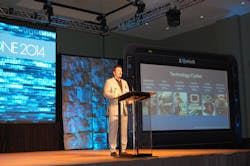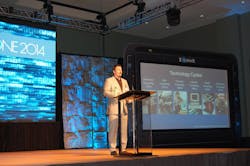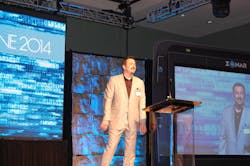Oliver (seen at right) also prefaced his overview with a time-honored philosophy regarding new technology as well: “Technology is great – when it works,” he stressed. “Yet while the Internet and everything associated with it has changed our lives up to now, the next evolution will really bring what I call the ‘full promise’ of the Internet and technology into reality: that together they’ll really make our lives simpler and easier, not more complicated.”
For starters, he touched on Google’s driverless car – a research project that’s been going on for several years by now. In Oliver’s view, what’s underappreciated about such technology is that not only are all vehicle OEMs working on such systems – automakers like BMW and Ford – it’s technology that’s expected to be publicly available by 2020 as a $5,000 add-on.
“Think about that: 2020. That is just six years away,” Oliver stressed. That’s how close it is – and it’s going to change everything we know about driving.”
Another “sci-fi” example of such “driverless” vehicles is the personal “PODS” used to transport passengers from London’s Heathrow International Airport to various parking lots. They are more “car-like” than train like though they don’t quite have the “open road” feel a true car would offer.
Zonar’s Oliver made a very interesting point in his discussion about how the pace of change where technology is concerned is occurring so rapidly it’s often time hard for the human mind to digest.
For example, if the wealth of knowledge created by human beings spans roughly 1.5 million years, it took some 800,000 of those years to learn how to make and control fire, then about 690,000 or so to design the wheel.Thus everything that’s come after those two inventions – the internal combustion engine, flight, space travel – is compressed into what is by comparison a very small time window.
In the past, Oliver said technology “change cycles” used to occur about every decade or so. Now that “cycle” is being tremendously compressed. Look at the Internet, for example: the first email network, Hotmail, went “live” in 1996, with Google launched a scant two years later in 1998. Wikipedia - the beginning of what Oliver calls “Web 2.0” - went live in 2001, followed by MySpace and Facebook in 2003.
Yet today, in 2014, all of those systems may seem “quaint” by our now rapidly-evolved technology standards. “The iPhone first rolled out in 2007; today there are 250 million ‘smart phones’ in use within the U.S.,” Oliver noted. “For me, growing up, the idea of talking to someone without seeing their face seems ridiculous – a farfetched desire. But for my 6 year-old son, that’s the only way he talks to people like his grandparents. In fact, he doesn’t want to talk to them if he can’t see them.”
The ability to stay connected 24/7 to interactive data is an outgrowth of this new “evolved” way at communicating, he said, which is one reason there’s so much interest in Google’s Glass project. While Glass is still in its infancy, Oliver pointed to the video below as an example of how it could change the very fabric of our everyday lives.
On a broader scale, Oliver pointed to the ongoing development of the “Internet of Everything” as how more globalized connectivity could affect everyday living – especially in terms of how goods, especially foodstuffs, are made and supplied to populations.
Here again the “driverless vehicle” makes an appearance – in this case, driverless tractor-trailers operating at a German dairy factory to keep the milk reference in the Cisco video above flowing.
Zonar’s Oliver also talked about the “next phase” of technological development could in some cases be described as a “connected collective,” whereby information is freely flowing in all directions and in myriad different ways to improve even mundane tasks.
Here’s an intriguing example Oliver touched on in this part of his discussion: The “Window of Opportunity” project funded by General Motors. In this demonstration, a thin interactive “membrane” similar to an iPhone is laid over a sedan’s rear windows, enabling passengers to interact with the window much like a computer – playing games or changing the “real” scenery to one from a city on the other side of the world.
Oliver than posited how this kind of technology could be applied to other “work surfaces” such as school desks or home windows.
“Think about building an office building where the view doesn’t matter because you can program the window to provide any view you want, from anywhere else on the planet,” he said. “Or imagine riding on a school bus and being to do your homework on the window.”
The key to all of this, stressed Oliver, is that none of this is “crazy” in terms of being too farfetched for reality. “It’s real; it’s here today and, though still in its infancy, it will all have a dramatic impact on our lives.”
And that, I’m sure, is putting things far too mildly.


